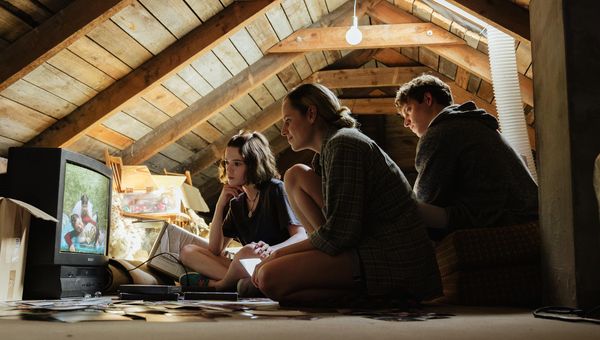Eye For Film >> Movies >> Where Do We Begin (2024) Film Review
Where Do We Begin
Reviewed by: Pavla Banjac

If there is anything that could guarantee a teary-eyed audience it would be an image of a happy family at Christmas. In Where Do We Begin – the Polish title of which translates as There Will Be No Other End – Monika Majorek takes us on an emotional journey structured around personal memories and VHS footage of a family of five forced to be a family of four after the father’s sudden death.
By the time that we see Ola (Maja Pankiewicz) beg her dad to pick up his phone, we can already sense how close the two are. The family’s VHS tapes show a healthy relationship between them, packed with smiles, hugs and Christmas presents. One of those, a camera, becomes not only Ola’s career path, but also her only way to try to recapture the memories.

As she returns home to find out that her mother (Agata Kulesza) is not only selling the house, but also dating someone new (Cezary Lukaszewicz), Ola turns to her younger siblings. Together with her brother Pipek (Sebastian Dela) and her sister Ajka (Klementyna Karnkowska), she goes through the family photos, trying to recreate them along with the past they captured.
Ola’s suffocating present, which the DOP Mateusz Skalski approaches with a tender close-up, is shown quite literally as she places a plastic bag over her head, struggling to breathe. Once the camera switches from static to hand-held, we follow her distressed and repeated attempts to reach her father and to recognise him on the street. Unexpected cuts to the slow-mo of a police search suggest something violent has happened, however the beautiful piano and string pieces by Bartosz Putkiewicz and Jan Ignacy Królikowski hint at something more tragic. Although the score’s recurrence starts to become tiresome, it’s clear that the intention is to disguise the many silent scenes which are crucial both to the characters as well as the rhythm.
Continuous experiments with different camera movements and blending the past and the present perfectly capture an intricate mind of someone who had lost their loved one. Not shying away from horror elements in brief dream sequences, nor the comic ones hidden mostly in outstanding intuitively written dialogue, Majorek creates a confident blend of genres that works. Slipping an occasional hint into the fired-up dialogues such as, "isn't it too soon to sell the house" helps us gradually unravel the intelligently written mystery that is the father’s death. As the selling of the house approaches, the relationships between the family members intensify, revealing the anxiety between Ola’s inability to move on, and the rest of the family’s eagerness to do so.
The final tour of the empty family house insists on closure, even if a forced one. Moving away signals moving on, especially for Ola, whose hands were covering her eyes from the horrible present repeatedly throughout the film. When she finally dares to look, she finds her family still there, however reconciled. Failing to get any answers which would help her understand the father’s passing, Ola tries to accept that an ending must remain an ending, and that – just as the literal translation of the Polish title suggests – there will be no other one.
Reviewed on: 27 Oct 2024














